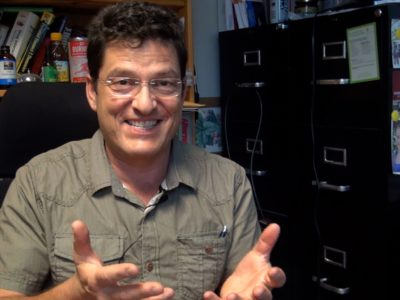 Note – This Post has been updated now to include a transcript with additional explanations. The updated transcript has been reviewed and approved by Dr. Karsenty.
Note – This Post has been updated now to include a transcript with additional explanations. The updated transcript has been reviewed and approved by Dr. Karsenty.
Gerard Karsenty chairs the Genetics Department at Columbia University. He’s credited with several discoveries, including the fact that the duodenum, which is a digestive organ between the stomach and the small intestine, is a source of the hormone serotonin, and that the serotonin signal that comes from the brain promotes healthy bone formation, and the serotonin signal that comes from the gut (read that as duodenum mostly), inhibits bone growth.
LISTEN (26 Minutes)
Most people know serotonin as the “feel good” hormone that is kept in greater circulation through anti-depressant drugs, which tamp down on the body’s ability to recycle the hormone quickly. You can see that method of action in the drugs through the name given to many of them, which is “SSRIs,” or serotonin re-uptake inhibitors. One side affect of the increased circulation of serotonin, caused by SSRIs, may be at least a slight increase of the inhibition of healthy bone formation. But that’s just a small part of what Karsenty has to say about bones, how they evolved, and how our hormones evolved with them . . . including leptin and osteocalcin — two hormones that appeared in evolution at the same time that animals started having bones. Here’s a background article about Karsenty from Time magazine. For podcast Karsenty did in 2010, click here
Interview Transcript
Approved by Dr. Karsenty – with paraphrases included, to explain some points in further detail which were discussed in greater brevity in the interview.
Gerard Karsenty, your research has been so interesting. You have discovered things that no one else seems to have known.
Karsenty
Thank you very much. We came with an idea and we were fortunate it seemed to be correct. We try to continue this work for the last ten years.
It sounds like it all started with a hunch.
Karsenty
It started when we realized that mice that were lacking a hormone named osteocalcin, which is made only in the bone cells that actually grow bone, called osteoblasts, were fatter than other mice and were more likely to produce less insulin. So we re-explored the clinical literature and the biology of bone and came with the hypothesis that there must be a common regulation between bone mass, reproduction and energy metabolism. Bone is one of the largest organs in the body, and it is the only tissue that contains a cell class called the osteoclast whose function is to destroy the host tissue. This allows for bone modeling which allows longitudinal growth of the skeleton. If you cannot grow, you cannot walk and if you cannot walk you can’t live, so by definition it is a survival function.
You’ve mentioned that osteoclasts only appeared in evolution when animals first evolved to have skeletons. So, I gather that earlier creatures, such as hard-shelled oysters and other mollusks, don’t have osteoclasts.
Karsenty
Yes, but they don’t need osteoclasts because shells don’t grow. You need to be able to destroy and reform bone to elongate the skeleton, so with a skeleton, you need osteoclasts, that break down bone, and osteoblasts, that build it up again. And also, throughout the life of any vertebrate, the body constantly needs to be cleaning out brittle and damaged bone and replacing it with fresh, resilient bone . . . all on the fly.
So you need to be able to destroy damaged bone cells, to make room for fresh bone cells.
Karsenty
Yes. This process of breaking down bone and rebuilding it again is very costly in energy and therefore in evolution, there was a need for a mechanism to make sure that animals were not going to grow when they could not eat when food was scarce. Our work suggests that there is indeed a co-regulation of bone mass accrual and energy metabolism so that we do not grow your bones at the wrong time and put all the other organs into failure.
If an animal is starving or hibernating, that’s when they won’t put a lot of effort into regrowing bone? If an animal is not hungry, if they are full and getting lots of signals that their body has plenty of energy, that’s when their bones will grow?
Karsenty
I will put hibernation aside because hibernation is different, but overall in vertebrates . . . it’s known that if you don’t eat your bones will not grow. In the illness, anorexia nervosa, where a child refuses to eat, he or she will not grow, and in adults, anorexia nervosa leads to osteoporosis. This is part of a clinical foundation of evidence that led us to propose that there’s a co-regulation of bone formation and metabolism.
In anorexia, people refuse to eat. How about in countries where children simply can’t get enough to eat.
Karsenty
Their growth is likely to be affected.
As for how some hormones help regulate the growth of bone, your description of the upstairs serotonin — the serotonin in the brain, and the downstairs serotonin — the serotonin in the gut — is very elegant.
Karsenty
Thanks. The fact that serotonin’s in the gut, which is the organ that takes in food, in other words where there is intake of energy, and thus that serotonin signals from the gut have an influence on bone growth . . . . It’s consistent with the general hypothesis that there is a common regulation of bone growth and energy metabolism because energy metabolism is not only appetite. It is also intake of food. So the fact that the gut’s release of serotonin might affect bone formation is consistent with the general scheme we are pursuing. In addition leptin influences serotonin synthesis and release in the brain, and osteocalcin in the bone influences insulin levels in the pancreas — all this is part of striving for a balance between reproduction, the growth of bone, and energy metabolism. Serotonin may be a major part of that regulation.
Most people think of serotonin as a hormone that makes them feel better. But from an evolutionary perspective, you’re looking at the fact that serotonin had a more basic function early on — it helped creatures survive by regulating metabolic signals and actions, and it helped them survive by promoting a behavior that increased their desire to go out and seek food.
Karsenty
Yes.
Do single-celled creatures have serotonin?
Karsenty
Well, at least . . . Worms have serotonin, and in worms, like in mice, serotonin favors appetite. If you remove serotonin from worms and mice, they don’t eat.
So, serotonin increases their behavior to go out into the world, and take risks in pursuit of food.
Karsenty
In pursuit of food. Yes.
That’s not how most people think of serotonin.
Karsenty (laughing)
I know, but that is one thing that it does.
Is the way that the upstairs serotonin, the serotonin in the brain, works, different from the downstairs serotonin, the serotonin in the gut?
Karsenty
Yes. Serotonin does not cross the blood-brain barrier. So serotonin made in the brain always stays in the brain. In the brain, serotonin favors bone growth and appetite. In contrast, serotonin made in the gut inhibits bone formation. Generally the levels of serotonin coming from the gut are higher than the levels coming from the brain. Even though it is less abundant than the amount of serotonin produced in the gut, brain-derived serotonin exerts the dominant function. Our evidence is, if you remove serotonin in mice from the brain and from the gut, what you see is the consequences of the absence of serotonin from the brain.
If serotonin’s missing upstairs, where serotonin promotes bone growth, and it’s also missing downstairs, where serotonin interferes with bone growth, the consequence is . . .
Karsenty
. . . is osteoporosis.
Serotonin in the brain favors bone formation, and even in smaller quantities, this brain signal is more powerful than the signal of bone inhibition that comes from the gut. Hmm. I’m thinking of descriptions that I’ve read that seem to indicate, in a young person’s body, the main bone growth happens at the ends of bones. In an adult’s body, and also when a bone breaks, there can be a need to break down the old, brittle or broken bone and rebuild it with fresh bone, anywhere within the bone. So, I’m wondering . . . Does the upstairs serotonin favor bone formation just at the top, spongy part of the bone, or does it help bone stay strong all the way through?
Karsenty
All the way through.
Let’s see . . . when the upstairs serotonin is high, it promotes bone growth AND appetite. So, I’m wondering, when the serotonin in the gut is high, and it’s inhibiting bone formation, does it also inhibit appetite?
Karsenty
No. Serotonin in the gut does not affect appetite. It is only serotonin in the brain that favors appetite.
You mentioned that when people take a selective serotonin reuptake inhibitor, meaning an SSRI such as Zoloft or Prosac, you know, basically an antidepressant, those drugs can interfere with bone growth. After all, they force a person’s body to keep any serotonin that’s released out in circulation longer, before the body can recycle it. And if serotonin downstairs inhibits healthy bones . . .
Karsenty
Selective serotonin reuptake inhibitors interfere somewhat with bone growth, but this is obviously a more complex mechanism because these drugs affect serotonin in the gut, serotonin downstairs, serotonin upstairs, they effect mood. And the interactions produce a mix of effects. In patients who take serotonin re-uptake inhibitors, in the long run they often develop a decrease in bone mass and an increase in appetite, which is something that we’ve observed in mice lacking serotonin in the brain.
I also found myself thinking about autism. Parents of autistic children have often reported that the children are prone to anxiety, and they’re also more prone to diarrhea and other indicators of intestinal distress. And one woman with autism who has trouble with anxiety, mentioned to me once in an interview that when her gut is giving her more trouble, and she’s more prone to an irritable bowel, she generally has felt more calm. And when her gut is digesting food peaceably, she has generally felt more anxious. This made me wonder whether, when her gut is distressed, it might release more serotonin, which might be like a body-made form of antidepressant. It might be part of why, when her digestion is upset, she feels more calm. Or another way to put it is that, since her digestion is often out of whack, perhaps she’s become habituated to higher serotonin levels from her gut, somewhat like becoming dependent on an anti-depressant. But when her digestion settles down, and the serotonin levels go down, she suffers withdrawal symptoms from the extra serotonin and therefor feels more anxious.
Karsenty
I don’t know. We have not studied autistic patients, so I don’t want to overextend our conclusion to something we have not tested.
Let’s switch to a question that’s more basic then. You’ve mentioned that most of the downstairs serotonin gets produced by a little pouch that’s under the stomach and above the small intestine — a pouch called the duodenum. What would cause the duodenum, to produce more serotonin.
Karsenty
We don’t know the answer to this question but this is something that is very important to us and that we are studying right now. But we don’t have the answer yet. Obviously it’s a very important question.
I’m wondering whether the duodenum sends out more serotonin when it’s damaged or distressed. So . . . Are inflammatory markers generally higher when the duodenum is producing serotonin?
Karsenty
We have not seen that.
In people who suffer from celiac disease, eating gluten containing grain products from wheat, rye or barley, leads to an auto-immune reaction that causes destruction and inflammation in their gut. In some celiac patients, the destruction takes place even if just half a teaspoon of gluten is consumed during a week. So if a celiac patient is eating foods that trigger damage to their gut, do they produce more serotonin in their gut?
Karsenty
I don’t know the answer.
So, I’m hearing you say that you’re starting to look into what exactly causes the duodenum to make more serotonin, and while you don’t know the answer yet, you’re going to try and find it.
Karsenty
Yes, we are asking that question.
When you mention that serotonin is the only hormone that has different functions upstairs and downstairs . . .
Karsenty
Actually there are other molecules that have varying effects, depending on where they’re produced and where they have their action. But serotonin is probably the only molecule affecting bone mass differently depending on its sites of expression. That I think is true.
Was it easier to figure this out for serotonin, because it’s doesn’t cross the blood-brain barrier, and in contrast, a lot of other hormones do cross the blood brain barrier, so it’s harder to tell what they do when they’re upstairs or downstairs.
Karsenty
Yes, that is true, though it’s not clear exactly how many of them function.
But we do know that some hormones, depending on where they’re made or where they’re acting, they do different things.
Karsenty
Yes we do know that about endorphins, for instance. But It’s not been shown that they affect bone to such an important extent as does serotonin.
Based on the theory that serotonin is involved in helping the body allocate metabolic resources to where they’re needed most, I found myself wondering whether the duodenum would inhibit bone growth by sending out more serotonin if, somehow, it’s needing to send a signal warning the rest of the body that the gut is damaged, and it needs to conserve energy to keep the digestive track maintained. What if the gut is sending out a higher serotonin signal to say, Guys, we need this energy because we’re in trouble, and so don’t put a lot of effort into building bone right now.
Karsenty
You have to realize that we are just at the beginning of this project. Even though it is three years old and we are now trying to explore why the gut regulates bone mass, we’re not at the point where we can answer a “why” question yet.
I see why the how question must be answered before the why question can be addressed. But . . er . . , my next question is another why question – You mentioned that when bones evolved, that evolution was also the moment where the hormones leptin, which comes from fat, and osteocalcin, which comes from the bone itself, evolved as well. We know now that leptin sends a signal to the rest of the body to regulate hunger and appetite, and that it also affects the body’s allocation of resources for building bone. But there’s also a signal about bone building coming from osteocalcin. It’s coming directly from the bone cells that help build bone, and it goes directly to the pancreas and the beta cells that produce insulin. If the osteocalcin signal is strong, it encourages the beta cells to produce more insulin and all the other cells in the body to be sensitive to the insulin signal and take in more sugar for energy. And interestingly, it also tends to encourage a body to be more lean. When osteocalcin signals are low, it inhibits the production of insulin, and it also seems to make cells resist the inclination to burn sugar as energy, and instead, what little insulin there is gets shunted off to increasing the storage of fat. So why? Or more specficially, why does a low level of osteocalcin lead to a low level of insulin in the pancreas? And conversely, when insulin levels are inadequate, why does the risk of fragile bones increase?
Karsenty
As vertebrates evolved to have skeletons, we also evolved a way to assure that the energetic costs of bone modeling during childhood and growth could stay in constant dialogue with energy metabolism. So insulin regulates bone mass and bone in turn regulates insulin, so the two organisms function hand in hand, so that we do not decide to grow when food is not around. This is not that we decided that bone has to regulate insulin. It is a more global organization. Bone growth has to be tightly regulated with energy metabolism to avoid failure of any other organism.
Most people think of insulin as a way to regulate sugars. But actually it’s allocating energy. And if the osteocalcin in the bones does not release the signals for the beta cells to produce more insulin, then wouldn’t you think that lowered osteocalcin levels would reduce how much energy the body will be storing as fat. Instead of low levels of osteocalcin increasing fat?
Karsenty
Yes. But again, you have to look at physiology in a more integrated way. There is bone but there are many other organisms. Bone is one player that was not recognized as being important before. We are trying to define its importance, but there are other organs that are influencing what happens, too.
Oh, so you’re focusing on getting bone into the playing field. It’s been left to the side as “bone is bone.” We’ve discovered fat can be an endocrine organ. You’re saying bone is part of it, too.
Karsenty
Yes, bone is an important part of the whole picture. In a way it is logical that it is part of the global orchestration because of this constant destruction and formation it goes through. You cannot decide to grow ten centimeters in six months at the same time we don’t eat, because if you do that, you will put all the other organisms into complete failure. No organ works in an vacuum and bone because of the modeling process and because of its sheer size relative to the rest of the body, has an influence on energy metabolism and reproduction much bigger than initially thought at all.
Now, you have developed many of your theories by working with mice as models of bones and metabolism. And you’re working on way to boost certain hormones that might promote more bone formation. This would be a great benefit because right now, most interventions for weak bones just stop them from being broken down by the osteoclasts, and that can lead bones to become brittle, rather than resilient the way we need them to be. You’re hoping to figure out some ways to let the osteoclasts keep cleaning out old bone, because you’ve got a way to increase the ability of the body to build fresh, new bone. And you’re basing a lot of that idea on rodent studies. But . . . Just how well does it work, translating your findings from rodents to humans? After all, when the hormone leptin was first discovered, rodents with low leptin levels tended to be fat, and when the rodents were given more leptin, they tended to slim down. At first, researchers thought that leptin would be a miracle cure for obesity. But then, they discovered that people who are obese usually have very high leptin levels . . . in fact much higher leptin levels than people have when they are thin. This led researchers to realize that unlike rodents, people are prone to leptin resistance, meaning that the higher the level of leptin in a person’s body, the more likely that their cells won’t hear the message from the leptin to reduce appetite. One reason for this may be that leptin resistance builds up slowly, over time, with the resistance being passed on from one cell to the next in line, and getting amplified each time it gets passed on. Rodents, because they don’t live very long, their cells don’t have as many generations to go through for building up leptin resistant. So their cells don’t get leptin resistant (or insulin resistant) very easily. Yes, you can create genetically altered mice where you “knock out” their responses to leptin or insulin. But making them simulate the hormone resistance that can build up in humans, slowly, over time .. . . that’s hard to do. So translating your findings to humans might be complicated.
Karsenty
It may or it may not. Time will tell. There are investigations on going. But I just want to make one point. The fact that we get some insights from rodent models is important for human research. I don’t know of any molecule that has been identified as a hormone in mice that has lost that characteristic in humans. The growing body of literature on osteocalcin, for instance, is that it’s regulating insulin sensitivity in humans. Obviously we want to confirm that. But it’s certainly an example of one of the insights we’ve gotten from rodent studies, and we hope it will help us in developing drugs for solving the problem of weak bones.
Are you hoping to translate it into a drug?
Karsenty
Yes, I’hoping to. Of course I’m hoping to.
Well, I’m not a scientist. I’m not involved in the field of patents or the profits that can come from drug discovery. I find myself thinking, what could we translate your great insights into, in terms of how people exercise and how they eat, so we wouldn’t need drugs to make it happen?
Karsenty
That is wishful thinking. Most people put in front of the food that they crave, at one point will succumb to temptation, and there is far too much temptation in the world today. We can’t go back in time and put us in caloric restriction. It does not work well. We have to deal with the fact that we live in a civilization of too much, and drugs have to take care of that. We can’t tell people to eat less and hope that they will do it.
If you were not indoctrinated into a society that believes that people are doomed to eat in unintelligent ways, and you were simply looking at metabolism. If you were in a world where there were no drug options and you wanted to promote healthy bones, how would you tell people what to eat.
Karsenty
I have no idea. I did not think about it because it is not the reality in which I live.
Well, my next questions involve a different topic. They involve some of the paradoxes in all these science discoveries involving bone. For instance, it’s my understanding that if a person’s leptin levels are low, that’s the most likely time when their body can build and remodel their bones.
Karsenty
Yes.
It’s as if their body’s cells are more sensitive to the signal of leptin, and with just a small whisper of signal, the body’s cells, and appetite, get the signal that there’s been enough food, and fat, in the body, that all is well. So that’s why a thin, healthy person can have strong bones. Their body is accurately getting the message from the whisper of leptin that there’s enough fuel around to be building and maintaining healthy bones. All that makes sense. But, then, what about when somebody is very obese, and they’re often hungry, even though their leptin levels are very high? These folks often feel hungry, and yet, people who are obese often have the strongest bones. People often think of leptin as the appetite hormone. But you say it started out as a hormone that signaled the body about whether or not there was enough energy stored as fat in order to work on building bone. So, how can a person with high leptin levels, who’s obese, feel hungry at the same time their bodies are getting some signal to build strong bones?
Karsenty
Because they are leptin resistant. It’s as if they don’t have leptin. Obesity is a state of resistance to leptin. These patients have high bone mass and that was part of our initial thinking. And as you know in evolution, leptin appears in time with bone. Not with appetite. So the leptin signal is one way that the body determines when it’s time to build bone, or not.
So let’s see if I’m understanding this a bit. If a person is obese, and their leptin levels are very high because they’re leptin resistant, hmmm, perhaps there’s one part of the brain that’s supposed to respond to high leptin levels by reducing appetite, – the hypothalamus – but that part of the brain has become leptin resistant and is so confused, that it doesn’t hear the leptin signal, and it thinks the body’s starving and so it keeps leptin levels high. Meanwhile, perhaps there’s another part of the brain – the arcuate nucleus – that responds to the high levels of leptin by understanding that there’s plenty of energy around, so it’s a great time to build bone.
Karsenty
Yes.
Alright then. Here’s another question. How about gastric bypass surgery for people who are obese. In gastric bypass surgery, doctors surgically connect the stomach to the intestines in a way that bypasses the duodenum. This surgery is sometimes successful at reducing their appetites, and their inclination to eat a great deal, and therefor, it does sometimes help a person who’s obese become less overweight. But it turns out that one side effect of this surgery is that it often increases the risk of weak bones in the person who’s gotten the bypass surgery. Now, when a person loses weight without using gastric bypass surgery, then generally that’s not thought to increase their risk of weak bones. So . . . Why would gastric bypass surgery make many people more prone to bone breaking?
Karsenty
This is a more difficult situation to interpret because when you do this type of surgery, you remove many molecules, not just serotonin. We don’t know yet the influence that each and every one of these molecules insert on bones. By doing that you think immediately, you remove serotonin and so you should have high bone mass. But you remove many more things than that. So it’s not a clean situation.
So that surgery does remove serotonin from the mix.
Karsenty
And many more molecules.
And many more mysteries. For instance, sometimes gastric bypass surgery cures Type 2 diabetes . . . almost overnight! Meaning that sometimes, a person’s appetite and energy get better, and their cells become more insulin sensitive, almost overnight. And researchers who report this don’t seem to think this involves any radical change of diet among the people who have undergone bypass surgery. They think the “cure” comes from the surgery. That’s puzzling, too. But I’m digressing. Please let me conclude by congratulating you for being on the trail of many discoveries.
Karsenty
I hope I will deliver some of them.
If you found a way to eat that would improve bone strength, and and people decided to follow your advice . . .
Karsenty
That would be nice, but we are not there yet.
Thank you. I appreciate talking with you.






3 comments for “Bone, Serotonin and Leptin – Gerard Karsenty”